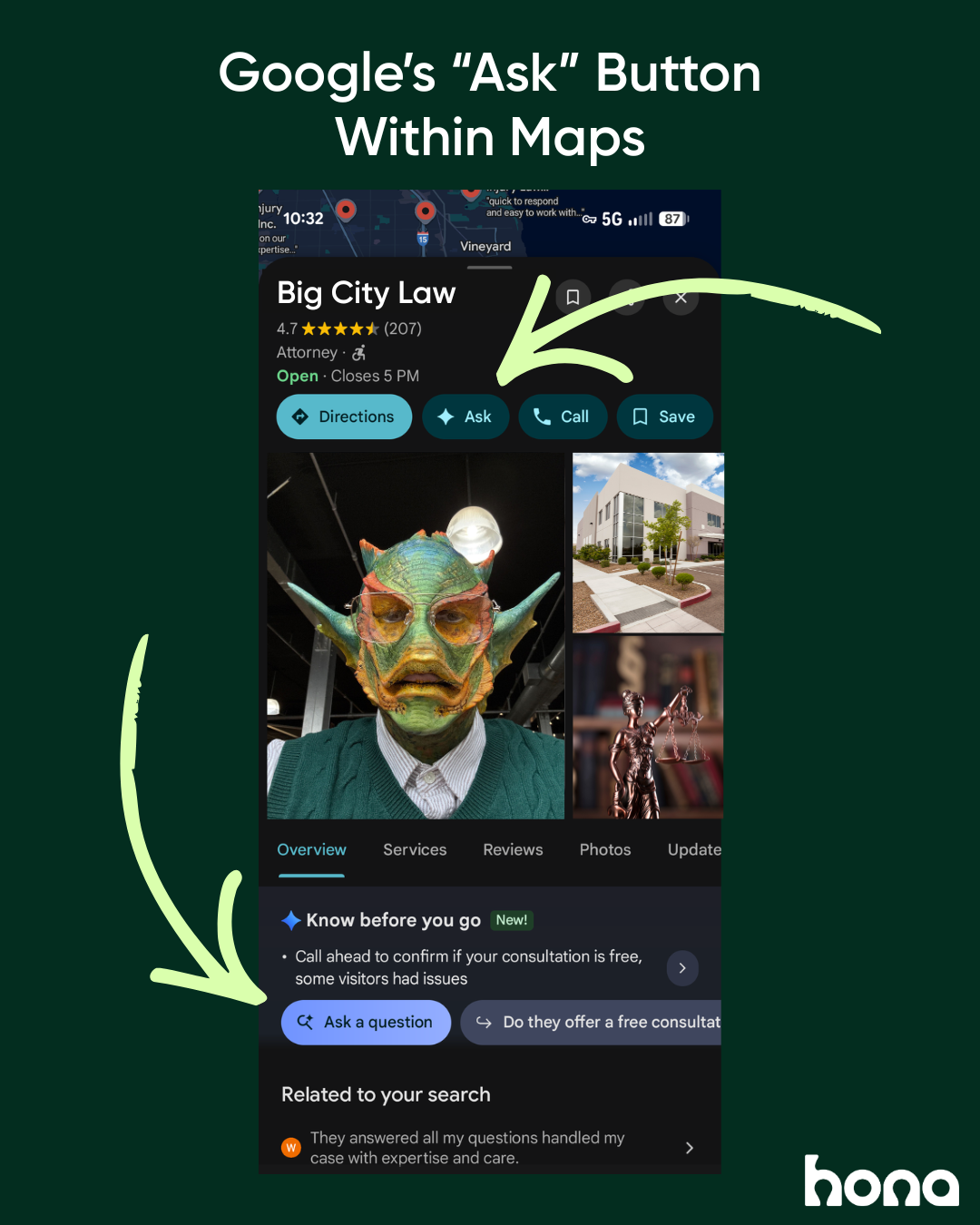
Don't Let Google Maps' AI-Powered Ask Button Give Wrong Information About Your Law Firm
Google now shows the new AI-powered “Ask” button in Maps and on Business Profiles. Don't let it give the wrong answers about your law firm.
The Hona Blog
Explore the Latest Trends, Tips, and Strategies in Legal Tech and Client Communication


Google now shows the new AI-powered “Ask” button in Maps and on Business Profiles. Don't let it give the wrong answers about your law firm.
While Google still shows the Q&A functionality on the backend in your Google Business Profile, it no longer appears for people looking your profile or searching for businesses like yours. Google now shows the new “Ask” button in Maps and on Business Profiles.
According to Google’s product team, “Customers can ask their question directly in Google Maps and get an updated, instant answer based on your answers and relevant reviews.” This Gemini-powered feature has been prioritized in December 2025 and it became more prominent during the summer of 2025.
Google pulls information from:
You can still answer questions about your law firm in your Business Profile. Just know this section is no longer visible to searchers.
According to Google: “Business Profile users can continue to answer existing questions about their business in the Q&A section in their Google Business Profile. Your published questions and answers will continue to power Google’s understanding of the real world and may be shown in Maps.”


Check and update these areas in your Business Profile and on your website to give Google’s AI all of the right information.
Make sure this information in your profile is up-to-date:
Inaccurate information in your profile will mean that Gemini and “Ask Maps” can’t answer correctly.
All of the information on your Business Profile must be the same on your website. Don’t provide Google with conflicting information. In particular, make sure the business name listed on Google is the same one found on your website.
Review your website’s accuracy and clearly label and update pages like:
Remember: AI is only providing the most likely answer to a question, not fact-checking, so you need to give it all the context. Your website is the best place to provide in-depth context about your law firm.
If you maintain a profile on any other review sites, like Yelp, or any directories of law firms, double check that all of your business information is accurate and updated.
Make sure that practice areas, business hours, contact information, staff information, etc. show up the same in every place someone might be searching.
Requesting more reviews! Google pulls information directly from reviews to populate answers in Maps. Legal marketing experts in particular note that Google seems to prioritize the user-generated answers that reviews already provide.
Here’s an example of the impact your reviews have on the answers given by Google’s AI via “Ask Maps.”
Rebecca was in a car accident. A few years ago she had to hire a personal injury lawyer for a slip-and-fall incident. But she remembers that the lawyer she hired then rarely contacted her. She felt isolated and confused, even though the case turned out in her favor. The communication was so bad she never referred that lawyer to anyone and mentioned it in her review.
In searching Google for other personal injury attorneys in her area, Rebecca comes across your firm. She wants to know upfront if your firm has a history of poor communication with clients. She uses the AI-powered “Ask” button to ask about your communication style.
If your firm has hundreds of positive reviews and many former clients mention how great your firm is at staying connected, Google is going to use that information to provide Rebecca’s answer.
So if you don’t have a solid process for requesting reviews, now’s the time to start.
Within its client portal and communication tools, Hona provides automated review requests. Set up these requests to send automatically via text message and the client portal at specific points in your case workflow.
Don’t miss out on valuable content that can revolutionize your law firm.

Law firms frequently deal with tight deadlines, heavy caseloads, and significant administrative work. But the right automations can specifically minimize burnout.
Law firm staff frequently deal with tight deadlines, heavy caseloads, and significant administrative work. These pressures contribute to stress, fatigue, and ultimately burnout. Introducing workflow automation software directly addresses these challenges, allowing firms to keep valuable employees productive and engaged over months and months.
Burnout in the legal field isn’t a minor inconvenience — it significantly impacts a firm’s stability and bottom line. Losing talented attorneys and experienced support staff means higher hiring costs, disruption of client relationships, and decreased productivity.
Workflow automation software addresses these challenges by easing administrative burdens. Attorneys and staff spend less time on repetitive or monotonous tasks, improving their overall work experience.
Introducing automated processes into law firm operations leads to improvements in employee satisfaction:
Team members increasingly prefer workplaces that demonstrate efficiency, modern tools, and a commitment to their employees’ quality of life.
Integrating automation software requires planning and clear communication. Steps to successful implementation include:
Over time, workflow automation software creates lasting benefits beyond immediate productivity gains:
Firms adopting workflow automation software invest in their people, promoting both short-term productivity and long-term employee retention. By removing tedious tasks, clarifying expectations, and fostering a healthier work-life balance, law firms create environments where attorneys and staff can thrive professionally and personally.

Online reviews significantly influence potential clients deciding whether to hire a law firm.
Online reviews significantly influence potential clients deciding whether to hire a law firm. While strong ratings clearly support search rankings, their importance reaches beyond simple SEO advantages. Positive client testimonials improve credibility, client trust, and overall business success.
People facing legal challenges look for reassurance that their attorney choice is sound. Client reviews provide quick validation that the law firm has successfully supported others in similar situations.
Potential clients often make quick judgments based on reviews, reinforcing the importance of regular client feedback.
A law firm’s brand goes far beyond logos or slogans. It reflects how clients experience the service provided. A steady stream of positive online testimonials contributes significantly to the firm’s perceived reputation.
Online visitors deciding on legal representation usually face stressful or emotional situations. Positive reviews reassure these prospective clients, increasing the likelihood they’ll choose your firm.
Client feedback is more than promotional material—it’s a tool for improvement. Reviews can highlight areas where the firm excels, as well as areas needing attention.
Encouraging satisfied clients to leave reviews shouldn’t be complicated. Simple, consistent strategies can yield significant results:
Managing online reviews involves actively responding to feedback, both positive and negative:
Beyond the direct SEO boost, consistent and positive client reviews deliver broader business benefits:
A strong collection of authentic reviews does more than merely enhance online rankings—it shapes client perceptions, boosts conversions, offers strategic business insights, and strengthens long-term firm success.

Large Language Models (LLMs), like ChatGPT and Bing Chat, have significantly changed how people search for and consume information online.
Large Language Models (LLMs), like ChatGPT and Bing Chat, have significantly changed how people search for and consume information online. Law firms aiming for maximum visibility in these emerging channels need an updated strategy. One effective technique is to adopt the IndexNow schema. This structured method of informing search engines and AI systems about new or updated website content ensures your firm stays current in real-time indexing.
IndexNow is an open protocol developed to speed up content indexing by search engines. Instead of waiting for web crawlers to eventually discover your website updates, IndexNow lets you actively notify major search engines like Bing and Yandex each time your website content changes.
In practical terms, once your law firm publishes a new article, blog post, or practice area update, the IndexNow protocol immediately sends an automated notification. This approach helps your content appear quickly in relevant searches, keeping your information timely and accurate.
Law firms thrive on accuracy and immediacy. Potential clients frequently search online for precise and timely legal information. A delayed or outdated presence in search results can harm credibility. By adopting IndexNow schema, your firm ensures:
Implementing IndexNow schema is straightforward. Here are practical steps to help your law firm begin using this protocol effectively:
Today, prospective clients often use conversational AI to quickly access legal information. IndexNow schema puts your firm’s content front-and-center within these emerging platforms. When someone uses ChatGPT, Bing Chat, or similar tools to inquire about legal topics you cover, your timely indexed content becomes readily accessible.
This proactive approach can lead directly to increased website traffic, heightened credibility, and improved chances of client acquisition. It positions your law firm as an authoritative source actively engaging with evolving digital technologies.
Law firms aiming to thrive in a digitally driven legal industry must stay responsive to technological changes. The IndexNow schema offers a practical way to achieve this, positioning your practice ahead of competitors slower to embrace innovation. As the role of AI and LLMs grows, proactive strategies like IndexNow help your law firm stay at the forefront of client engagement and digital visibility.
Stay proactive, get indexed quickly, and ensure your law firm is prominently featured whenever and wherever potential clients seek legal answers.

Law firms manage sensitive and confidential information daily. Protecting client data isn’t merely an ethical obligation—it’s also legally required.
Law firms manage sensitive and confidential information daily. Protecting client data isn’t merely an ethical obligation—it’s also legally required. Maintaining compliance with privacy regulations is critical for your firm's reputation, client relationships, and long-term success. A proactive privacy approach not only shields your firm from risks but also enhances client trust.
Every law firm collects and stores client details, including financial, personal, or medical information. Clients place enormous trust in your firm to handle their sensitive data carefully and responsibly. A data breach or mishandling of information can swiftly erode client confidence, trigger legal penalties, and damage your firm’s reputation.
Conversely, strong privacy practices position your firm as trustworthy, reliable, and professional, reassuring current and potential clients that their information remains safe and protected.
Several essential data privacy regulations directly affect law firms:
General Data Protection Regulation (GDPR) applies not just to European firms but any organization handling the personal data of European residents. It mandates strict consent guidelines, transparent data collection, and secure storage practices.
The California Consumer Privacy Act (CCPA) provides California residents greater control over their personal information. Firms dealing with California-based clients must meet detailed requirements for disclosure, client consent, and secure data management.
Additionally, the Health Insurance Portability and Accountability Act (HIPAA) comes into play if your firm deals with healthcare-related records. HIPAA demands high security for handling personal health data, imposing strict controls over access and sharing.
Compliance requires ongoing effort, not just a one-time setup. Law firms benefit from creating and implementing clear policies around data privacy. Your firm’s compliance strategy should start by clearly defining how sensitive information is collected, stored, accessed, and discarded. Written guidelines ensure your entire team understands their specific roles and responsibilities.
Perform regular internal audits to review procedures and policies, ensuring all practices continue to align with current regulations. These regular check-ins help identify areas of potential risk or emerging issues early on, allowing timely corrective action.
Privacy compliance significantly depends on employee awareness and behavior. Regular and focused training sessions help staff recognize privacy concerns, preventing inadvertent mistakes. Offering relatable, real-world examples of privacy situations can further strengthen employee understanding.
Creating a workplace culture that openly addresses privacy issues is equally important. Employees should feel comfortable bringing forward potential concerns or reporting breaches immediately, without fear of negative repercussions. This openness encourages a proactive approach to privacy management firm-wide.
Law firms need strong technical safeguards to protect sensitive client data. Encrypting emails, using secure client portals, and implementing multi-factor authentication for system access greatly reduce risks. Additionally, ensure access to sensitive information is limited strictly to necessary personnel, further safeguarding client privacy.
By proactively selecting technology solutions designed for legal practice—such as encrypted storage, secure messaging platforms, and robust access controls—your firm can significantly lower risks associated with data breaches or unauthorized disclosures.
Despite preventive measures, breaches can still occur. Having a clear, effective response plan minimizes damage and ensures your firm addresses incidents professionally and transparently. Establish a predefined procedure outlining steps to immediately identify, contain, and resolve breaches.
Quickly informing affected clients about breaches demonstrates accountability. Transparency about what happened, what your firm is doing to resolve the issue, and how you will prevent future occurrences reassures clients and preserves trust.
Compliance with data privacy regulations provides legal protection and a competitive advantage for your law firm. Clients increasingly value privacy, and firms known for secure handling of confidential information earn higher client loyalty and more referrals.
Establishing solid privacy compliance strategies now positions your firm as forward-thinking, responsible, and reliable, ensuring continued success and client confidence in an increasingly privacy-conscious market.

Rethinking standalone eSignature tools is more than just about convenience; it’s a strategic decision that enhances efficiency, reduces costs, and improves experience.
As digital transformation reshapes the legal industry, law office managers are reconsidering their reliance on standalone eSignature tools. Integrated client portals, like Hona, offer built-in eSignature capabilities that streamline processes, reduce costs, and enhance client experience.
Law firms adopting Hona have noted significant operational improvements:
Rethinking standalone eSignature tools is more than just about convenience; it’s a strategic decision that enhances efficiency, reduces costs, and significantly improves the overall client experience. Law office managers who embrace integrated client portals with built-in eSignature capabilities are better positioned for sustainable success.

As law firms compete more fiercely for clients online, many attorneys are contemplating whether partnering with a digital marketing agency is worth the investment.
As law firms compete more fiercely for clients online, many attorneys are contemplating whether partnering with a digital marketing agency is worth the investment. Here's what you need to know to make an informed decision.
A reputable digital marketing agency can significantly enhance your law firm's visibility and client acquisition. Services typically include:
Evaluate your firm's current capabilities, growth objectives, and internal resources. If your firm lacks dedicated marketing personnel, technical SEO knowledge, or content creation capabilities, hiring a digital marketing agency could significantly enhance your firm's competitive edge.
In conclusion, investing in a digital marketing agency can lead to substantial benefits, provided you select the right partner who understands your goals, aligns with your budget, and demonstrates clear expertise in legal marketing.